[Photos by Brian Sokol/UNHCR, text by UNHCR.]
What would you bring with you if you had to flee your home and escape to another country? More than 1 million Syrians have been forced to ponder this question before making the dangerous flight to neighboring Jordan, Lebanon, Turkey, Iraq or other countries in the region.
This is the second part of a UNHCR project that asks refugees from different parts of the world, “What is the most important thing you brought from home?” The first installment focused on refugees fleeing from Sudan to South Sudan, who openly carried pots, water containers, and other objects to sustain them along the road.
By contrast, people seeking sanctuary from the conflict in Syria must typically conceal their intentions by appearing as though they are out for a family stroll or a Sunday drive as they make their way towards a border. Thus they carry little more than keys, pieces of paper, phones, and bracelets – things that can be worn or concealed in pockets. Some Syrians bring a symbol of their religious faith, others clutch a reminder of home or of happier times.
[Below are extended captions to the photographs seen in the slide show above.]
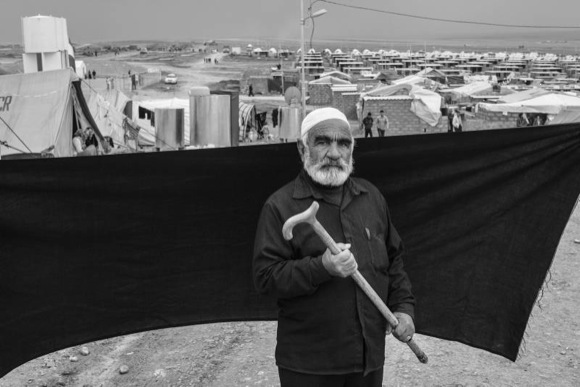
Ahmed, 70, holds his cane in Domiz refugee camp in the Kurdistan Region of Iraq. Without it, he says, he could not have made the two-hour crossing on foot to the Iraqi border. "All I want now is for my family to find a place where they can be safe and stay there forever. Never should we need to flee again." He, his wife and eight of their nine children fled to the border when their home in Damascus was destroyed in an attack. Together with four other families – 50 people in all – they left in the back of an open-topped truck. Ahmed`s one son who remained behind was killed in October 2012.
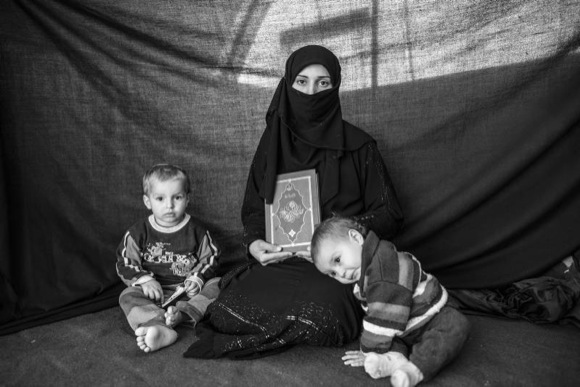
Iman, 25, with her son Ahmed and daughter Aishia, in Nizip refugee camp, Turkey. They fled their home in Aleppo after months of conflict. Iman decided it was time to flee when she heard accounts of sexual harassment against women in Aleppo. The journey to Turkey was full of danger – Iman lost five relatives. The most important thing she was able to bring with her is the Koran she holds in this photograph. She says the Koran inspires a sense of protection. "As long as I have it with me, I`m connected to God."
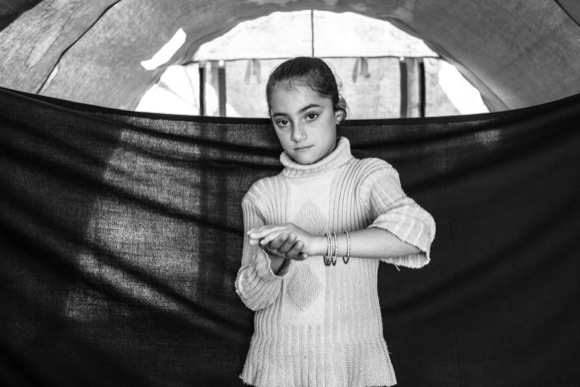
Eight-year-old May in Domiz camp in the Kurdistan Region of Iraq. The girl and her family made their way by foot and bus hundreds of kilometres from Damascus to the border, where they followed a rough trail in the cold while her mother carried her baby brother. Since arriving in Domiz, she has had recurring nightmares. The most important thing she was able to bring with her when she left home is the set of bracelets she wears in this photograph. "The bracelets aren`t my favourite things," she says, "My doll Nancy is." She adds that the toy was left behind in the rush to leave.
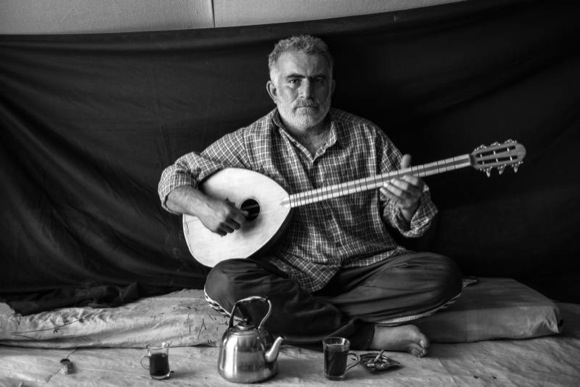
Omar, 37, holds a buzuq, or long-necked lute – the most important thing that he was able to bring with him to Domiz refugee camp in the Kurdistan Region of Iraq. Omar decided it was time to flee his home in the Syrian capital of Damascus the night that his neighbours were killed. "The killers came into their home, whoever they were, and savagely cut my neighbour and his two sons,” he recalls. Omar says that playing the buzuq "fills me with a sense of nostalgia and reminds me of my homeland. For a short time, it gives me some relief from my sorrows."
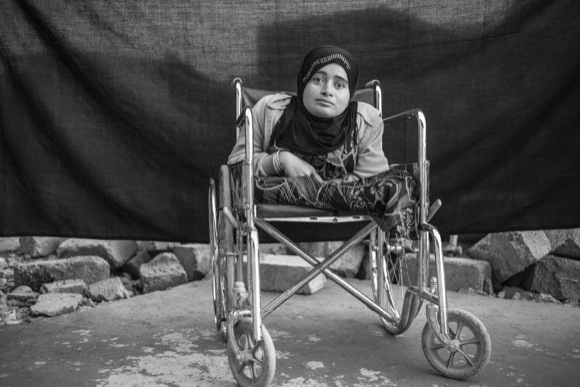
Alia sits in her wheelchair in Domiz refugee camp in the Kurdistan Region of Iraq. The 24-year-old was living with her family in Daraa, Syria, when fighting forced them to flee their home. Confined to the wheelchair and blind in both eyes, Alia says she was terrified by what was happening around her. "Men in uniforms came and killed our cow. They fought outside our house and there were many dead soldiers. I cried and cried," she says. Alia says the only important thing that she brought with her "is my soul, nothing more – nothing material." When asked about her wheelchair, she seems surprised, saying she considers it an extension of her body, not an object.
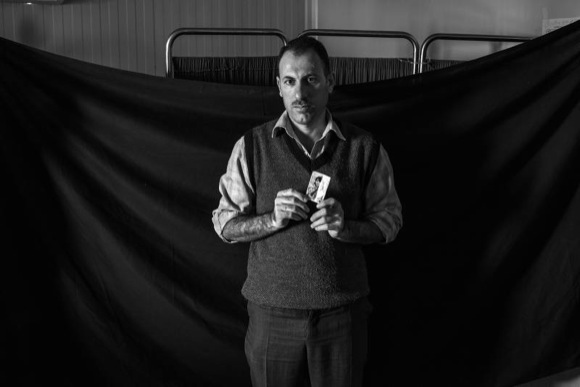
A doctor, Waleed, 37, poses for a portrait in the Médecins Sans Frontières clinic where he works in Domiz refugee camp in the Kurdistan Region of Iraq. He is carrying his most valuable possession, a photograph of his wife. Although they are together, he says, "This is important because she gave me this photo back home before we were married, during the time when we were dating. It always brings me great memories and reminds me of my happiest time back home in Syria.” He fled Syria 20 days after his wife gave birth. “I left the country for the sake of my family. I don’t want to see my children grow up as orphans.”
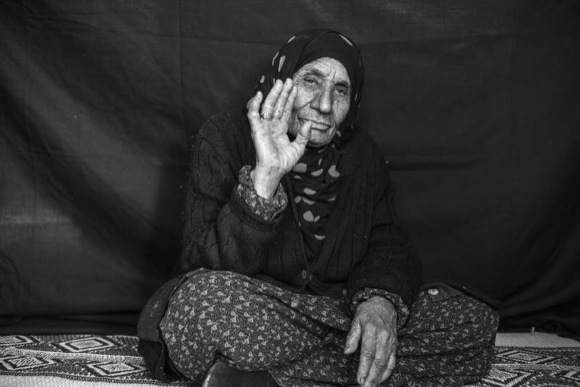
Salma, who is aged at least 90, wears an old ring that she was given by her dying mother when she was just 10 years old. Salma says her mother told her, “Keep this ring and remember me." She intends to wear the ring to her grave. "It`s not valuable – not silver or gold – just an old ring. But it`s all that I have left." She was photographed in Domiz refugee camp in the Kurdistan Region of Iraq after fleeing with her three sons and their families from Qamishly City, Syria
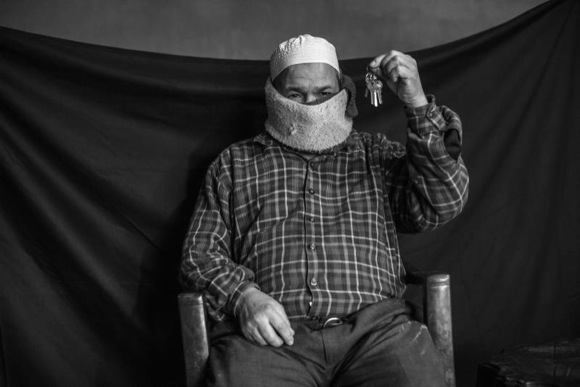
Abdul holds the keys to his home. Although he doesn`t know if the family`s apartment is still standing, he dreams every day of returning home. "God willing, I will see you this time next year in Damascus," he told UNHCR in Lebanon’s Bekaa Valley. He and his family fled their apartment in the Syrian capital shortly after his wife was wounded in the crossfire between armed groups. Abdul, his wife, their daughter and her children share a plywood shelter constructed by UNHCR and the Danish Refugee Council.
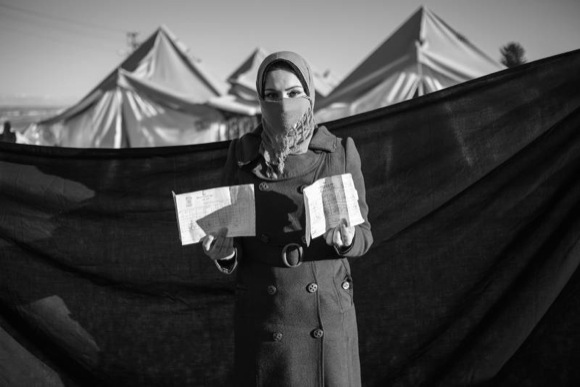
Tamara, 20, in Adiyaman refugee camp in Turkey. After Tamara`s home in Idlib was partially destroyed in September, the family decided their best chance of safety was to reach the Syrian-Turkish border. "When we left our house, we felt the sky was raining bullets," Tamara recalled. "We were moving from one shelter to another in order to protect ourselves." The most important thing she was able to bring with her is her diploma, which she holds. With it she will be able to continue her education in Turkey.
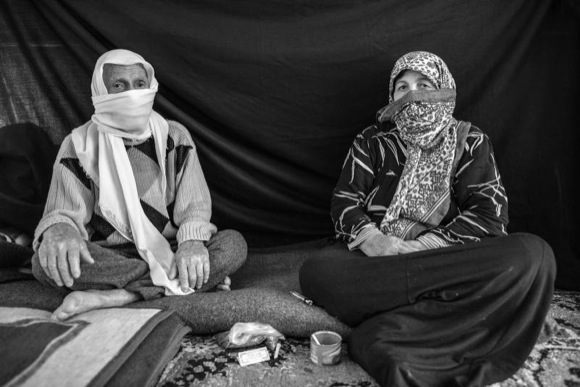
Ayman, 82, (left) and his wife 67-year-old wife, Yasmine – the most important thing Ayman was able to bring with him from Syria. "She`s the best woman that I`ve met in my life," he says. "Even if I were to go back 55 years, I would choose you again." The couple, seen here in Nizip refugee camp, Turkey, fled their rural home near Aleppo after their neighbour and his son, a shepherd, were brutally killed. Their home stands on land covered with olive trees, grapes, nuts and fruits. Breaking into tears, Ayman describes how nearby farms came under attack and homes were looted and set on fire. "It is unbelievable that any human being can do this to another," adds, Ayman, who misses his farm.
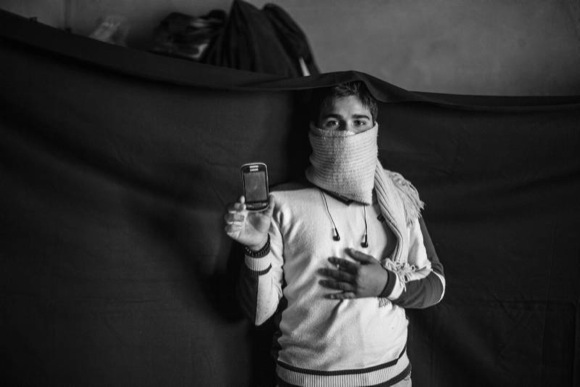
Yusuf holds his mobile phone in the building where he now stays in Lebanon’s Bekaa Valley. He and his family fled their home in Damascus last year. He values his phone highly. "With this, I`m able to call my father. We`re close enough to Syria here that I can catch a signal from the Syrian towers sometimes, and then it is a local call to phone home from Lebanon." The phone also holds photographs of family members who are still in Syria, which he is able to keep with him at all times.
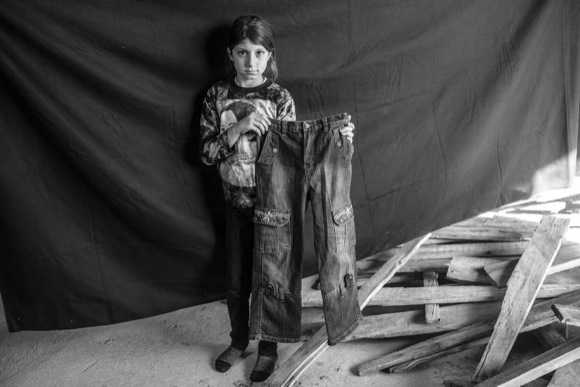
Leila, 9, holds up a pair of jeans that she brought with her from Syria to Erbil in the Kurdistan Region of Iraq, where she and her family found shelter. "I went shopping with my parents one day and looked for hours without finding anything I liked. But when I saw these, I knew instantly that these were perfect because they have a flower on them, and I love flowers," she explains. Leila has only worn the jeans three times, all in Syria – twice to wedding parties and once when she went to visit her grandfather. She says she won`t wear them again until she attends another wedding, and she hopes it, too, will be in Syria. Her family fled from Deir Alzur in Syria after their neighbours were killed by a shell. They now live in an uninsulated, partially-constructed home; there are about 30 people sharing the cold, draughty space.
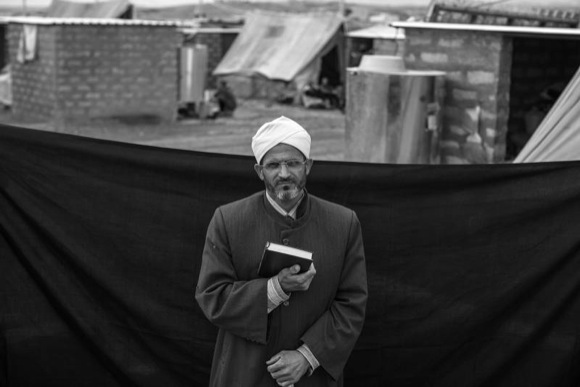
Mohamed, a 43-year-old refugee from Syria’s Hassakeh Governorate, is the imam of the only mosque in Domiz camp in the Kurdistan Region of Iraq. He holds the Koran, the most important thing that he was able to bring with him. As an imam, religion is the most important aspect of his life. "I love my religion, but I am not so strict in my views. I want to teach the importance of brotherhood and equality between all religions," he says. Mohamed fled his home with his wife and six children after warnings that armed elements were searching for him.
(All photos are copyright UNHCR/B. Sokol)